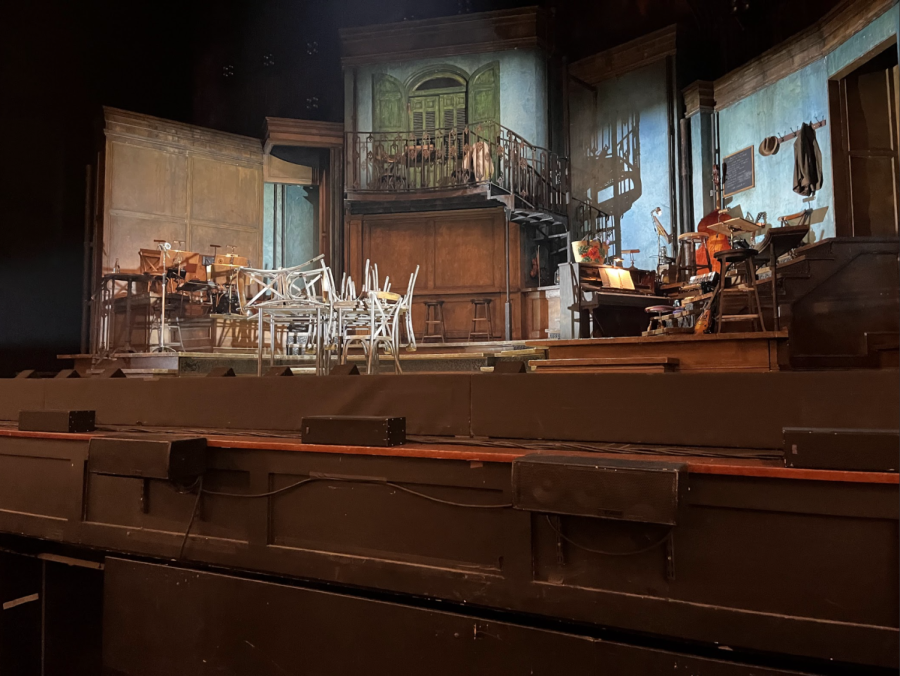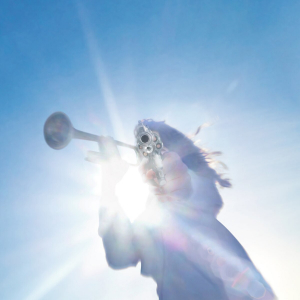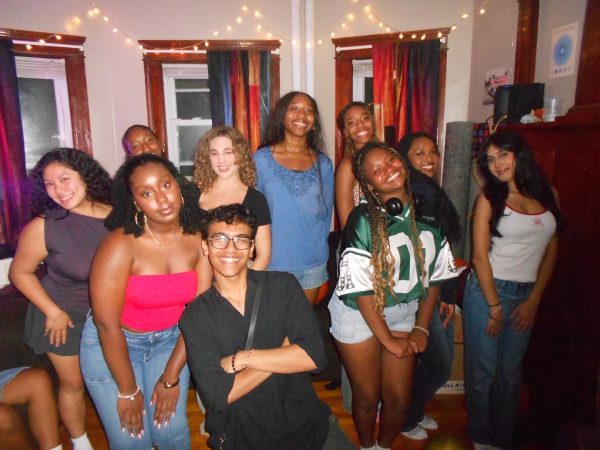I Saw Hadestown and I Am in Shambles: My experience at the Hanover Theater watching Hadestown
SPOILER ALERT: This article discusses the story behind the musical, as well as details about the production itself.
I grew up in musical theater. My mom was constantly playing show tunes in the car and it inspired me to join my school’s drama club in the fourth grade. The very first musical I saw – Wicked on New York City’s Broadway – had only been a few years before my entrance into drama club. I remember it changing my life in more ways than one. I had read every single Wizard of Oz book by L. Frank Baum to prepare for the musical, which of course, was not necessary. Wicked is the “untold story of the witches of Oz” and it changes the way you see its iconic characters like the Scarecrow, Tinman, and, of course, Glinda (formally known as GA-linda) and the Wicked Witch of the West (formally known as Elphaba). After seeing and mentally processing the production, I reread all of the Wizard of Oz books and started reading retellings, like “Dorothy Must Die” (which I have different opinions on but nevertheless). However, none of them managed to compare to how Wicked made me feel both as an audience member and as a person. I’ve been changed for good.
Wicked remained my favorite musical for a long time (only second to Little Shop of Horrors, which I watched/listened to constantly and then saw on Broadway in 2021). I was lucky enough to see a few musicals between then and now (both national tours and on Broadway), and nothing even came close to it until I saw Hamilton in 2017 – which technically does not count, as it is in an entire league of its own. But alas, a musical was able to surpass my favorites, which had stood in the first and second-place spots for as long as I can remember.
If you have not heard of the Tony and Grammy Award-winning musical, Hadestown, you are missing out. It is adapted from Anaïs Mitchell’s fourth studio album of the same name, released by Righteous Babe Records on March 9, 2010, who had adapted it from the Greek myth of Orpheus and Eurydice. However, a few years prior, Mitchell had staged performances of the album but was not sure how the theatrics would play into the stage musical, so she had published it as a concept album instead. The album had been in the works for about ten years, and it was not for another ten years that the musical would finally be brought to life.
Described as a “folk opera”, the concept album began with the courtship of Eurydice and Orpheus in “Wedding Song”. Conversely, the first song on the 2019 musical album is “Road to Hell”, which was not on the original concept album. The album has quite a few songs that did not make it to the musical, and the musical has several new songs that were not originally on the primary album. Almost entirely told in song, the musical is narrated by Hermes, the messenger God and son of Zeus, as he follows Orpheus and Eurydice’s tragic love story, similar to the original album. Although the album lacks the background voices of the chorus from the musical, it seems Hermes has a much more primary role in the musical than in the original.
The tale, in summary, is a tragedy. Orpheus, the poet and lyricist son of Apollo, falls deeply in love with Eurydice and claims to marry her. However, on the day of their wedding, Eurydice gets lost, trips and falls, allowing herself to get bit by a venomous snake, which kills her. Orpheus hears of his wife’s death and ascends to the Underworld to reclaim her from Hades, who denies it at first. After singing him a song, which reminded him that he once loved his wife, Persephone, just as Orpheus had loved Eurydice, Hades allows Orpheus to take Eurydice back. Of course, like with all deals with the devil, there is a catch: Orpheus must go back the way he came (walking a rough road with many challenges, both physical and mental), with Eurydice walking behind him. Orpheus was not to check that his wife was walking safely behind him throughout the whole journey or Eurydice would be sent back to Hell with no hope of return. At the very last minute, he glances over, sending her back to the afterlife forever, failing Hades’ test.
Now, onto my experience of the musical.
I got tickets to Hadestown in December 2022 for the holidays (Thanks, Mom!), and I was ecstatic I could see this show she and my sister had been gloating about since they saw it earlier in the year – especially because it was in a theater in Worcester! Even though I was a theater kid and have been living in Worcester for almost two years now, I had never stepped foot into the Hanover Theater before. Stepping into the theater, for the first time in over three years, was an overwhelming experience for a number of reasons. One, there were SO. MANY. PEOPLE. We were packed in like sardines from the start, I felt like I was going to get some sort of sickness the second I got there, even though I was wearing my extra-protective mask. Two, I have never been to a regional theater where there was artwork and children’s projects lining the walls, all relating to the show and its themes. I remember being in awe of the album cover concept art that remind them of the messages of the show, and how the fanart of the show was made by local students who were passionate about art and the show. My roommate and I spent about half an hour wandering around the theater, exploring and looking at the incredible artwork surrounding the lobby and the staircases. Third, despite the theater being huge, the stage was small. The picture (above) is a close-up view of the set and stage setup, which is absolutely gorgeous. The stage itself, much like the story, is not at all what it seems. Similar to Hamilton, the stage has two spinning pieces: the center is a large wooden circle that spins clockwise, and the perimeter of the circle spins in the opposite direction. Also similar to Hamilton, the dances are often very movement heavy, with sharp, heavy stomps for the journey and whimsical arm motions for the slower, romantic ballads. The back part of the stage, the large wooden panel, actually opened up during a few parts of the show, signifying the door to Hadestown had opened. The audience gasped as it opened up for the first time, revealing Hades. It was used in multiple songs in the show, along with Eurydice’s final moments before heading to the underworld for eternity. Although, my favorite part of the stage was the band set-up: half of the stage was for the lower-pitched instruments and the other half was for the higher-pitched ones.
In most Broadway productions, the orchestra sits below the stage in the pit, hidden from the actors and the audience. However, becoming ever more popular is the practice of having a band on stage with the performers, sometimes even being involved in the performance itself – interacting with audience members and performers, being a part of the story, etc. Dear Evan Hansen, SIX, The Great Comet, Once, and of course, Hadestown are a few examples of bands being on stage and/or a part of the performance. One thing I REALLY enjoyed about the show was that not only did the trombone (the instrument I played for about ten years in high school and does not get enough recognition as an instrument) have multiple solos, but almost every performer did. About halfway through the show, the actress playing Persephone, announced all of the players and their instruments, making sure each of them got their moment to shine. Not only did this happen, but four (FOUR!) of the ten actors apart of the production each played an instrument and participated in the instrumental and vocal parts of the production.
Unlike when I saw Wicked for the first time, I went to Hadestown without hearing the soundtrack before (with the exception of one song– “Wait for Me”). I had, however, known of Orpheus’s myth beforehand. Like my roommate, I was in denial that the musical would end the same way the myth did (despite one of the first lines of the show being “It’s a sad tale, it’s a tragedy”), but alas, it ended with Orpheus giving in and Eurydice was sent back to Hell. However, the musical had a different ending than the original myth. Instead of being killed by a snake bite, Eurydice dies in a growing blizzard after going out to look for food and firewood, calling out for her husband in her final moments. This was likely done for theatrical reasons (it’s much easier to stage a storm than a snake bite), and I will not complain because I love that idea so much better.
Not only did it present beautifully on stage, but the fact that Eurydice was killed in an attempt to help her and her husband survive during a harsh winter, added so much more to the story (and Eurydice and Orpheus’s relationship) than the original myth. It allowed for Orpheus’s guilt to play a really big role in his development (especially with Eurydice’s fear of the wind). His guilt for not hearing her or checking on her while she was in danger, then changed into making sure she was behind him while they traveled through another storm (of course, that lead to the tragic ending, but nevertheless, its development). That being said, it also gave Hades more reason to allow Orpheus to try: he took advantage, knowing that Orpheus’ guilt would doom Eurydice back to Hell.
I also LOVED the use of fog and lighting in the production, it really added a lot to the meaning of the story, as well as contributed to many, many tears from me and the audience.. In one of the most well-known songs, “Wait for Me” (the song I expected to cry to the most), Orpheus takes his journey to Hadestown in an attempt to get Eurydice. The fog grows and the lights dim, displaying the dark and stormy road Orpheus had ahead, and all of a sudden, when the chorus starts, hanging lights start swinging in the air, landing about five feet from the stage. It is hard to describe it in words, as I am still processing it myself (and it’s hard to describe something as incredible as this was in a single article), but trust me on this, it was magnificent, truly one of the most beautiful performances I have ever seen. I cried a lot just from the beauty of it. The reprise of the song (the song I ACTUALLY cried the most to), was even more incredible – singing through Orpheus and Eurydice’s journey on the long road from Hell. I cannot listen to either of them without crying.
There are, however, two songs from the album I have been playing on repeat since I saw it live: “Anyway the Wind Blows” and “Chant” (still bring tears to my eyes but not nearly as many as others). I connect to “Anyway the Wind Blows”, (maybe that is why I am playing it on repeat), Of course, it certainly does help that Eva Noblebeza (Broadway’s original Eurydice) has the absolute sweetest voice and delivers a perfect performance to introduce the audience to the show, a perfect second song, and transition into the story. Noblebeza’s riffs are gorgeous on the online soundtrack, but it is an entirely different experience listening to it live. It is the moment Orpheus meets the love of his life, and it transitions into Orpheus trying to win Eurydice’s heart: his first words to her were “come home with me”, despite Hermes’ suggestion to take it slow. “Chant” is an underplayed and underrated Hadestown song, although there is not much emotion as the other songs, it is still amazing – it gives me chills every time it pops up on my phone. The beat of the song is march, with the low base sounding like the pounding of footsteps. The song encapsulates the dictatorship that Hades has on his servants and his wife. It is also the first time the audience sees Persephone stand up for herself and how much she dislikes Hades’ “neon necropolis”. It is also a heavy trombone song, which I adored.
Neither compares to my favorite song on the album– and probably one of my favorite love songs in all of musical theater– “All I’ve Ever Known”, which is Orpheus and Eurydice’s vulnerable ballad. They fall in love, and the audience falls right with them (or at least, I did). Eurydice expresses “All I’ve ever known is how to hold my own, but now I want to hold you” to her new lover, a vulnerable moment between the two of them. It also may just be my favorite line I have ever heard– my heart broke when I heard it for the first time. Not only did I resonate with it a lot, growing up independent and not trusting people to the full extent, but it was a gorgeous presentation of hope and love. Orpheus, in turn, accepted her vulnerable state and seemed to fall more in love with her than he had before.
I fell in love with this musical, just as I had fallen in love with the song, and Orpheus and Eurydice. I lack the proper words to express my extreme gratitude to the Hanover Theater, the company of Hadestown, and Anais Mitchell for literally changing my life. I do not think I have felt this way about a production in a long time– at least not since Wicked. If you have the opportunity, please PLEASE go see this show, or at least listen to the music. It is glorious.




